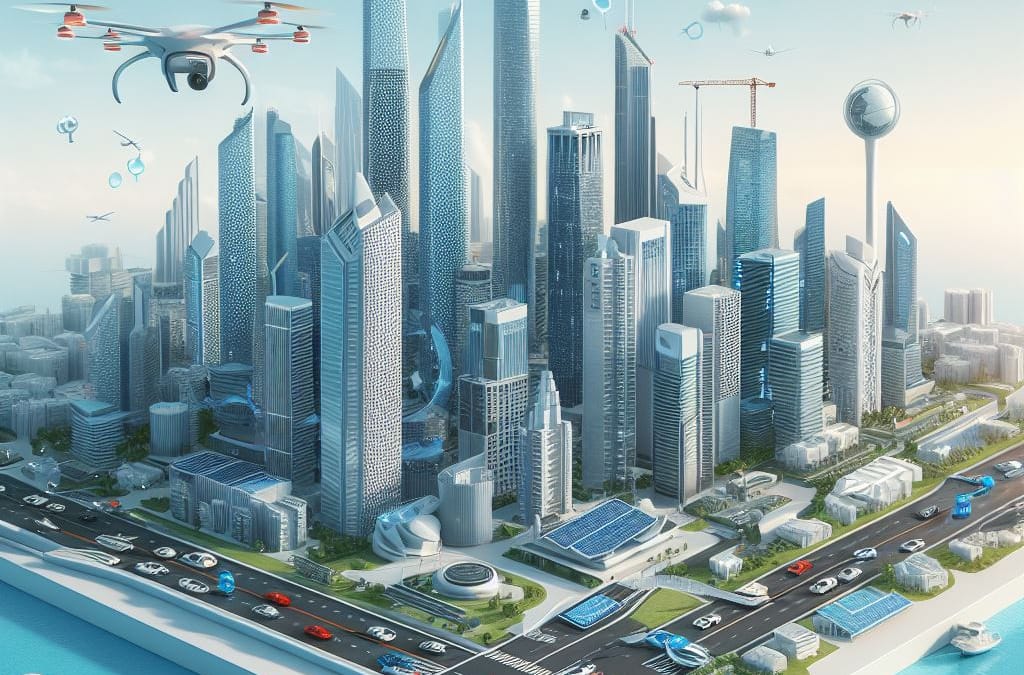In our rapidly progressing world, urbanization has become a central theme in shaping the future of societies. As cities continue to expand, there is a pressing need for efficiency, sustainability, and improved quality of life. Enter the era of smart cities – a concept that harnesses technology and data to build intelligent urban environments.
What are Smart Cities?
Smart cities are a nexus where innovation, connectivity, and urban development converge. They leverage cutting-edge technology and data analytics to optimize urban services, enhance resource management, and improve the overall quality of life for residents. These cities integrate various sectors such as transportation, energy, healthcare, governance, and infrastructure to create an interconnected and efficient urban ecosystem.
Key Technologies Powering Smart Cities:
Internet of Things (IoT): The IoT plays a pivotal role in the advancement of smart cities. By connecting devices, sensors, and infrastructure, cities can gather real-time data to improve operational efficiency, infrastructure maintenance, and resource allocation.
Big Data Analytics: Smart cities generate an enormous amount of data from sensors, smart devices, and social media platforms. Harnessing this data through advanced analytics helps authorities make informed decisions, optimize resource allocation, and improve service delivery.
Artificial Intelligence (AI): AI algorithms and machine learning techniques are employed to make sense of the vast amounts of data collected in smart cities. AI enables predictive analytics, intelligent traffic management, energy optimization, and personalized services.
Renewable Energy Integration: Smart cities prioritize sustainability and strive to reduce their carbon footprint. To achieve this, they focus on integrating renewable energy sources into the power grid, optimizing energy consumption through smart grids, and fostering energy-efficient practices in buildings.

Benefits of Smart Cities:
Enhanced Quality of Life: Smart cities optimize the delivery of public services, including transportation, healthcare, public safety, and waste management. This ensures that citizens enjoy convenient and responsive services, leading to an improved quality of life.
Efficient Resource Management: Through real-time data analysis, smart cities can efficiently manage resources such as electricity, water, and transportation. This allows for reduced wastage, better infrastructure utilization, and improved environmental sustainability.
Economic Growth and Innovation: Smart cities foster economic growth by attracting new investments, encouraging entrepreneurship, and creating job opportunities in technology and digital sectors. They become hubs for innovation, research, and development, fueling economic advancement.
Improved Sustainability: With a focus on renewable energy integration, optimized transportation systems, efficient waste management, and environmentally friendly infrastructure, smart cities contribute to a greener and more sustainable future.
Challenges and Considerations:
Privacy and Data Security: The vast amount of data generated by smart city initiatives raises concerns about individual privacy and data security. Robust systems and regulations must be in place to protect personal information and ensure secure data management.
Digital Inclusion: As smart cities rely heavily on technology, it is crucial to bridge the digital divide and ensure equitable access to digital services. Efforts must be made to provide equal opportunities for all citizens, including those in underserved communities.
Long-Term Sustainability: The implementation and maintenance of smart city infrastructure require long-term planning and financial resources. Collaborative partnerships between governments, private entities, and citizens are vital to ensure the sustainability of smart city initiatives.
Case Studies of Successful Smart Cities:
Singapore: Known as a global leader in smart city development, Singapore implements advanced technologies in transportation, housing, healthcare, and sustainability. It focuses on enhancing citizen engagement, optimizing energy consumption, and improving urban mobility.
Barcelona: Barcelona emphasizes citizen-centric initiatives by integrating technology into public services, including smart parking, waste management, and efficient water management systems. It has also created a digital platform, “Sentilo,” to share and analyze real-time data for improved decision-making.
Copenhagen: Renowned for its commitment to sustainability, Copenhagen aims to become the world’s first carbon-neutral capital by 2025. It employs smart city solutions, including energy-efficient buildings, smart grids, and an extensive cycling infrastructure, to reduce its environmental impact.
Conclusion:
The rise of smart cities brings forth a paradigm shift in urban development. By harnessing the power of technology, data, and innovation, cities can transform into efficient, sustainable, and interconnected ecosystems that prioritize the needs and well-being of their citizens. However, challenges such as privacy, digital inclusion, and long-term sustainability must be addressed to ensure equitable and successful implementation. The future lies in the hands of smart cities, as they pave the way towards a more sustainable and intelligent urban landscape.


Recent Comments